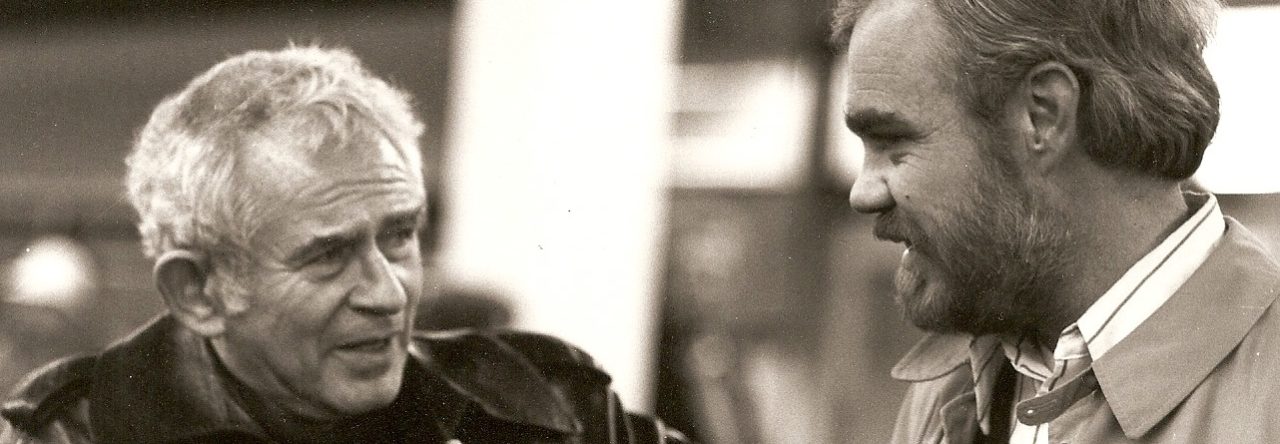A Conversation with J. Michael Lennon by Phillip Sipiora
J. Michael Lennon’s authorized biography, Norman Mailer: A Double Life, was published by Simon & Schuster on October 15, 2013. This interview took place over two days in late July 2013.
Sipiora: When and where did you meet Norman for the first time? What were your first impressions of him, both as a person and as a celebrated author?
Lennon: I met Norman in the early fall of 1972 at Western Illinois University in Macomb, Illinois. I had corresponded with him before that. I wrote to him after I saw him on the Dick Cavett show where he got into his famous fight with Gore Vidal, and felt impelled to tell him how much I thought he had been wronged by Vidal on the air. He wrote back and said that he was going to be speaking in Illinois not far from the University of Illinois-Springfield where I was teaching a Mailer seminar. So, several members of the seminar drove up with me to hear him speak. This was just before the election. McGovern was running against Nixon and the country was in ferment. After the speaking event, a lot of us went to a bar, and I introduced myself to him. He remembered who I was, and we stayed in the bar and talked until about 2 o’clock in the morning, talked about everything under the sun. He was filled with energy, amazing energy; he was drinking gin and tonics steadily, but was burning right through the booze. At that time, he was 49 and at the height of his powers. He was curious about me, not as curious as I was about him, of course, but he was curious, he was forthcoming, he was funny, he was bawdy, he was angry at Nixon, he was worried about the country. Very easy to get along with, not at all remote or guarded. At the end of the night he asked me where I was from and I said New England, and he said that he lived in Provincetown, and invited me to visit him. A few summers later, my wife and went to see him, and later we started bringing our three sons, seeing him nearly every summer all through the 70s and 80s, either in Maine or in Provincetown. Those visits forged the relationship, and initiated a long correspondence.
Sipiora: Do you feel that at the beginning of your relationship with Mailer there was some kind of personal chemistry between you and Norman?
Lennon: At the time, I had no idea he that he enjoyed Irishmen and liked their bravura, as he put it, their openness and sense of humor. I think what he saw was that I knew a lot about his work. I was writing my dissertation on his work, and had written him letters about my ideas. And he’d written back. I was enthusiastic about his work, and I knew many of the obscure things that he had written. I had also ferreted out interviews he had given on talk shows; I used to tape things off the TV and the radio. I still have all those old tapes. I was assiduously collecting everything that he said and everything that was said about him in print, which was the beginning of a huge archive. He was impressed with that, that I liked his stuff, that I knew his stuff. He may have sensed that I was in there for the long run. But the idea of writing his biography never occurred to me, not consciously, at least.
Sipiora: I read the biography in ten days and when I closed the book I felt as if I had gone ten rounds at the gym. My head was swimming and I was exhausted, exhilarated, yet hungry for more. I had the strong feeling that nine hundred pages were not enough for the incredibly roller-coaster life that Mailer led. How did you feel when you finished the first draft? Were you satisfied that everything important was included?
Lennon: The first draft was 90,000 words longer than the one you read. It was 415,000 words, but I still felt that there were more things that could have been said. But you’ve got to think about flow and pace. My editor, Bob Bender of Simon and Schuster, told me, “Look, the book will be preposterously long. We’re talking about a book of 1400-1500 pages, a real cinder block. No one will buy it and you will defeat your own purposes. You will have fewer readers rather than more. So you’ve got to slash away.” He was right, of course, and I began cutting, and rewriting as well. It took about two months. I cut 70-75,000 words and sent it in and Bob cut another 10-15,000. It’s about 325,000 now. I didn’t think it could be cut any more when I sent it to Bob, but he did a beautiful job, I must say. I did lose some material having to do with the literary battles that were going on between Lillian Hellman and Mary McCarthy, and Lillian Hellman and Diana Trilling. Mailer was close to them, and was dragged into their feuds. Richard Poirier was also involved. The fights went all the way back to the 1930s and the Red Scare of the 1950s; they were pointing fingers at each other about who was a real anti-communist and so forth. It took a lot of explication and really should be handled in a separate narrative. Mailer saw himself as the grand seignior, the arbiter of the literary world at that time. It’s impossible to imagine anybody else playing that role today.
